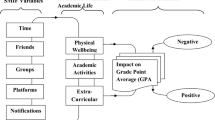Abstract
This paper is a reflection on the history and future of educational media. Over the last century various new media technologies were introduced in education. Most of these failed to meet the high expectations. The paper reviews the rise and fall of various “revolutionary” learning media and analyses what went wrong. Three main driving factors are identified that influence the educational system: 1) educational practice, 2) educational research, and 3) educational technologies. The role and position of these factors is elaborated and critically reviewed. The paper concludes with identifying a number of relevant developments that substantiate a favourable future outlook of media for learning.

Similar content being viewed by others
References
Almenda, M. B. (1988). Speaking personally with Gayle Childs. American Journal of Distance Education., 2(2), 68–74.
Baldwin, N. (1995). Edison: Inventing the century. New York: Hyperion.
Bates, A. (1995). Technology, open learning and distance education. London/New York: Routledge.
Benjamin, L. T. (1988). A history of teaching machines. American Psychologist, 43(9), 703–719.
Bitzer, D., Lichtenberger, W., & Braunfeld, P. G. (1961). PLATO: an automatic teaching device. IRE Transactions on Education. E-4, 157–161.
Burkhardt, H., & Schoenfeld, A. H. (2003). Improving educational research: toward a more useful, more influential, and better-funded enterprise. Educational Researcher, 32(9), 3–14.
Casimir, H. B. G. (1987). Natuurwetenschap, techniek en maatschappij. In H. B. G. Casimir (Ed.), Waarneming en Visie. Over Wetenschap en Maatschappij (pp. 40–48). Amsterdam: Meulenhoff.
CBS. (2009). De digitale economie 2009. Heerlen/Den Haag: Centraal Bureau voor de Statistiek.
CERI. (2000). Knowledge management in the learning society. Paris: Organisation for Economic Co-operation and Development.
Clarck, R. E., & Estes, F. (1998). Technology or craft: what are we doing? Educational Technology, 38(5), 5–11.
Clarck, R. E. (2001). Learning from Media. Arguments, analysis and evidence. Information Age Publishing, Greenwich.
Cuban, L. (2001). Oversold and underused, computers in the classroom. Cambridge: Harvard University Press.
Cuban, L. (1986). Teachers and Machines. The classroom use of technology since 1920. New York: Teachers College Press.
Darrow, B. (1932). Radio: the assistant teacher. Columbus: R.G. Adams.
De Bie, D. (2002). Het beperkte nut van onderwijsonderzoek. HBO-Journaal, oktober, 40–41.
De Vries, G. (1985). De ontwikkeling van wetenschap. Een inleiding in de wetenschapsfilosofie. Groningen: Wolters-Noordhoff.
Dijksterhuis, E. J. (1950). De Mechanisering van het Wereldbeeld. 6th edition, 1989. Amsterdam: Meulenhoff.
European Commission. (2008). Shaping the ICT research and innovation agenda for the next decade. Report on the European Commission’s Public On-line Consultation. Brussels: European Commission. Retrieved Februari 23, 2011 from http://ec.europa.eu/enterprise/newsroom/cf/itemlongdetail.cfm?item_id=2521 Internet World Stats (2011) Data retrieved Mai 4, 2011 from http://www.internetworldstats.com/stats.htm
Kaestle, C. (1993). The awful reputation of education research. Educational Researcher, 22(1), 23–31.
Kaufman, R. (1998). The Internet as the ultimate technology and panacea. Educational Technology, 38(1), 63–64.
Kearsley, G. (1998). Educational technology: a critique. Educational Technology, 38(1), 47–51.
Laaser, W. (1986). Some didactic aspects of audio-cassettes in distance education. Distance Education, 7(1), 143–52.
Lagemann, E. C., & Shulman, L. S. (1999). Issues in education research: problems and possibilities. San Francisco: Jossey-Bass.
Lewin, K. (1946). Action research and minority problems. Journal of Social Issues, 2, 34–46.
Lover, E., Radlinski, F., Crespi, V. H., Millet, J., & Cushing, L. (2004). Online study behavior of 100,000 students preparing for the SAT, ACT, AND GRE. Journal of Educational Computing Research, 30(3), 255–262.
Mirande, M. (2006). De onstuitbare opkomst van de leermachine. Assen: Koninklijke Van Gorcum.
Onderwijsraad. (2008). Onderwijs en maatschappelijke verwachtingen. Den Haag: Onderwijsraad.
Papert, S. (1980). Mindstorms. New York: Basic Books.
Pressey, S. L. (1926). A simple apparatus which gives tests and scores and teaches. School and Society, 23(586), 373–376.
Pressey, S. L. (1933). Psychology and the New education. New York: Harper and Bros.
Reiser, R. A. (1987). Instructional technology: a history. In R. M. Gagne (Ed.), Instructional technology. Hillsdale: Lawrence Erlbaum Associates.
Reeves, T. (2005). Design-based research for advancing educational technology. In M. Valcke, K. de Cock, D. Gombeir, and R. Vanderlinde (Eds.), Meten en Onderwijskundig onderzoek. Proceedings van de 32e Onderwijs Research Dagen (pp. 33–39). Universiteit Gent, Vakgroep Onderwijskunde, Gent.
Reeves, T. (2006). Design research from a technology perspective. In J. Van den Akker, K. Gravemeijer, S. McKenney, & N. Nieveen (Eds.), Educational design research (pp. 52–66). New York: Routledge.
Robinson, V. (1998). Methodology and the research-practice Gap. Educational Researcher, 27(1), 17–26.
Sarason, S. B. (1993). The predictable failure of educational reform: Can we change course before it’s too late? San Francisco: Jossey-Bass Publishers.
Schank, R. C., & Cleary, C. (1995). Engines for education. Hillsdale: Lawrence Erlbaum Associates, Inc.
Shaver, J. P. (1983). The verification of independent variables in teaching methods research. Educational Researcher, 12(8), 3–9.
Skinner, B. F. (1958). Teaching machines. Science, 128(3330), 969–977.
Sleeman, D., & Brown, J. S. (1982). Intelligent tutoring systems. New York: Academic.
Stokes, D. E. (1997). Toward a new research paradigm. Pasteur’s quadrant: basic science and technological innovation. Washington: Brookings Institution Press.
Thorndike, E. L. (1905). Elements of psychology. New York: A.G. Seiler.
Von Mises, L. (1957). Theory and history, an interpretation of social and economic evolution. New Haven: Yale University Press.
Westera, W. (2005). Beyond functionality and technocracy: creating human involvement with educational technology. Educational Technology and Society, 8(1), 28–37.
Westera, W. (2010). Food for thought: what education could learn from agriculture. Educational Technology Magazine, 50(6), 37–40.
Westera, W. (2006). The E-Learning Cabaret: Do’s and Don’ts in E-Learning Design, Book of Abstracts, Online Educa Berlin, 12th International Conference on Technology Supported Learning and Teaching (pp. 169–171). Berlin: ICWE-GmbH.
Author information
Authors and Affiliations
Corresponding author
Rights and permissions
About this article
Cite this article
Westera, W. The eventful genesis of educational media. Educ Inf Technol 17, 345–360 (2012). https://doi.org/10.1007/s10639-011-9162-z
Published:
Issue Date:
DOI: https://doi.org/10.1007/s10639-011-9162-z




